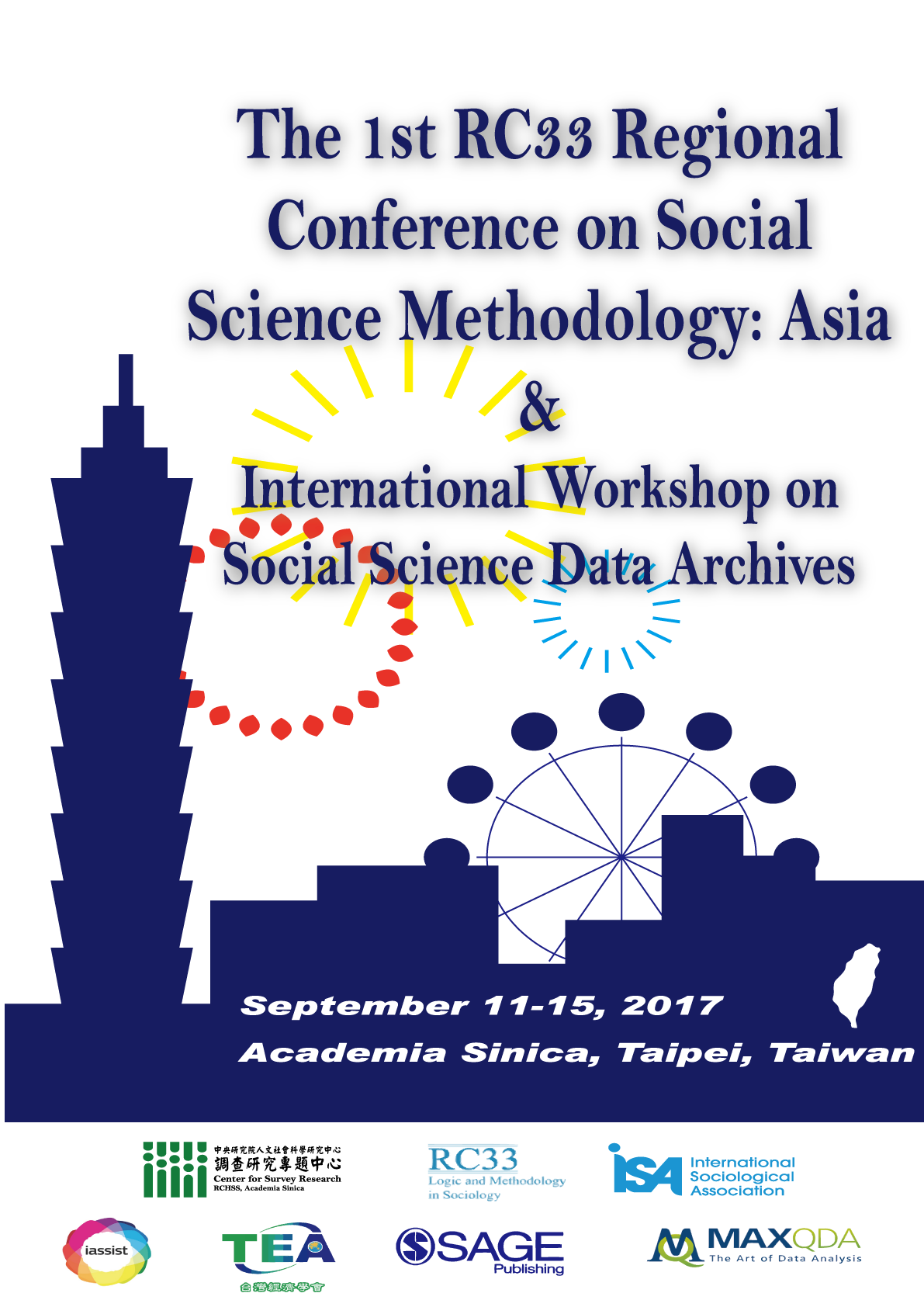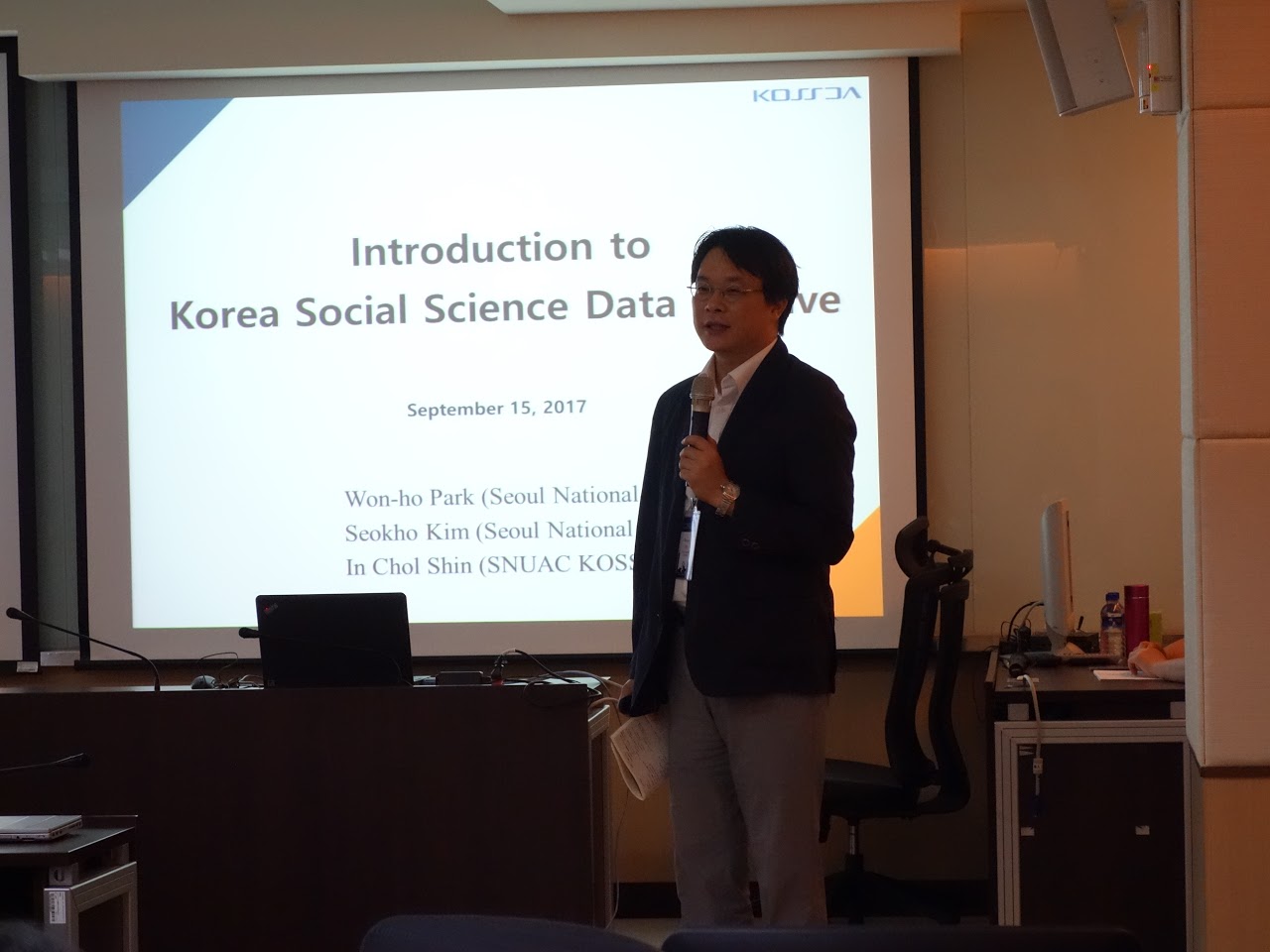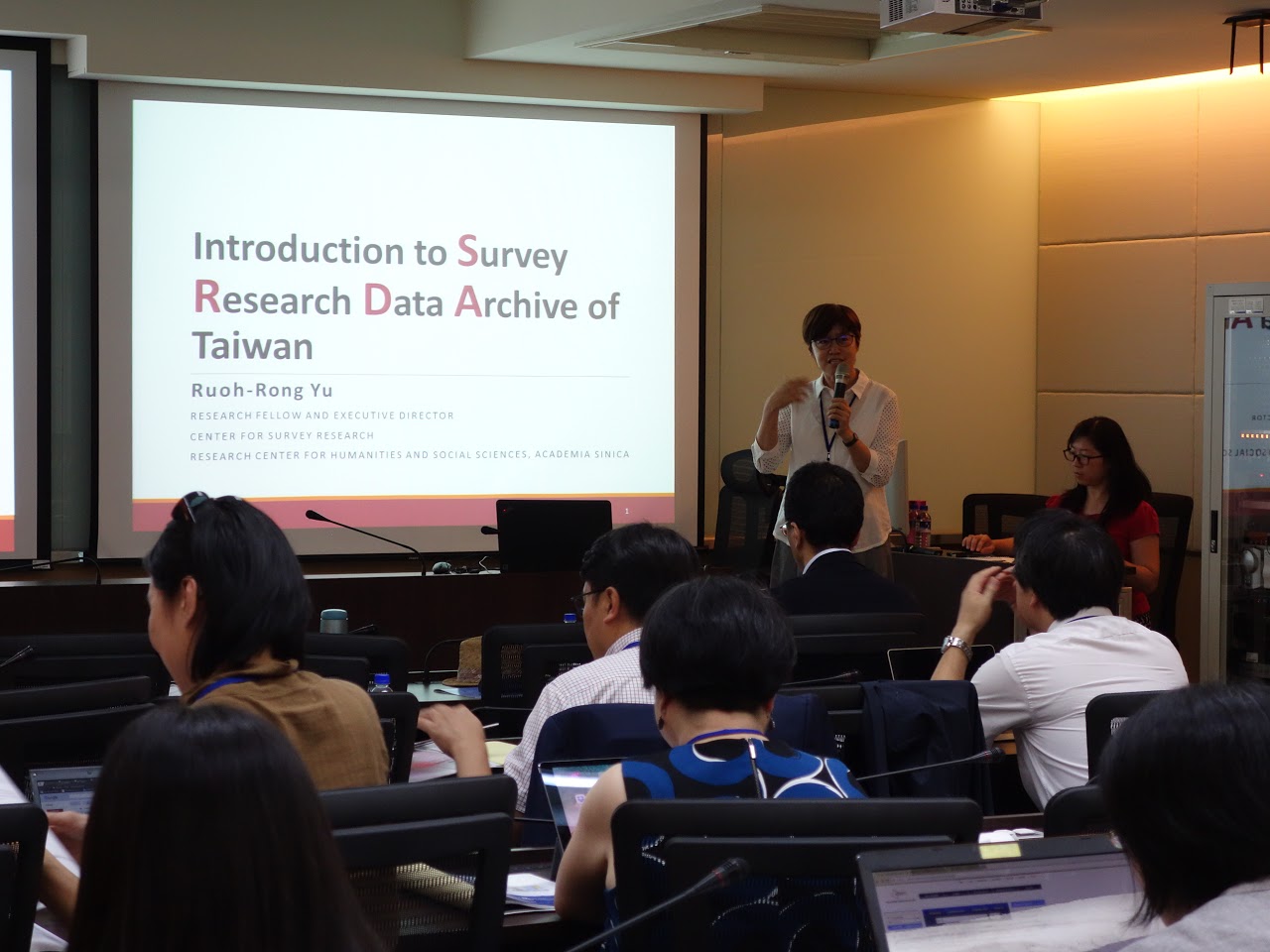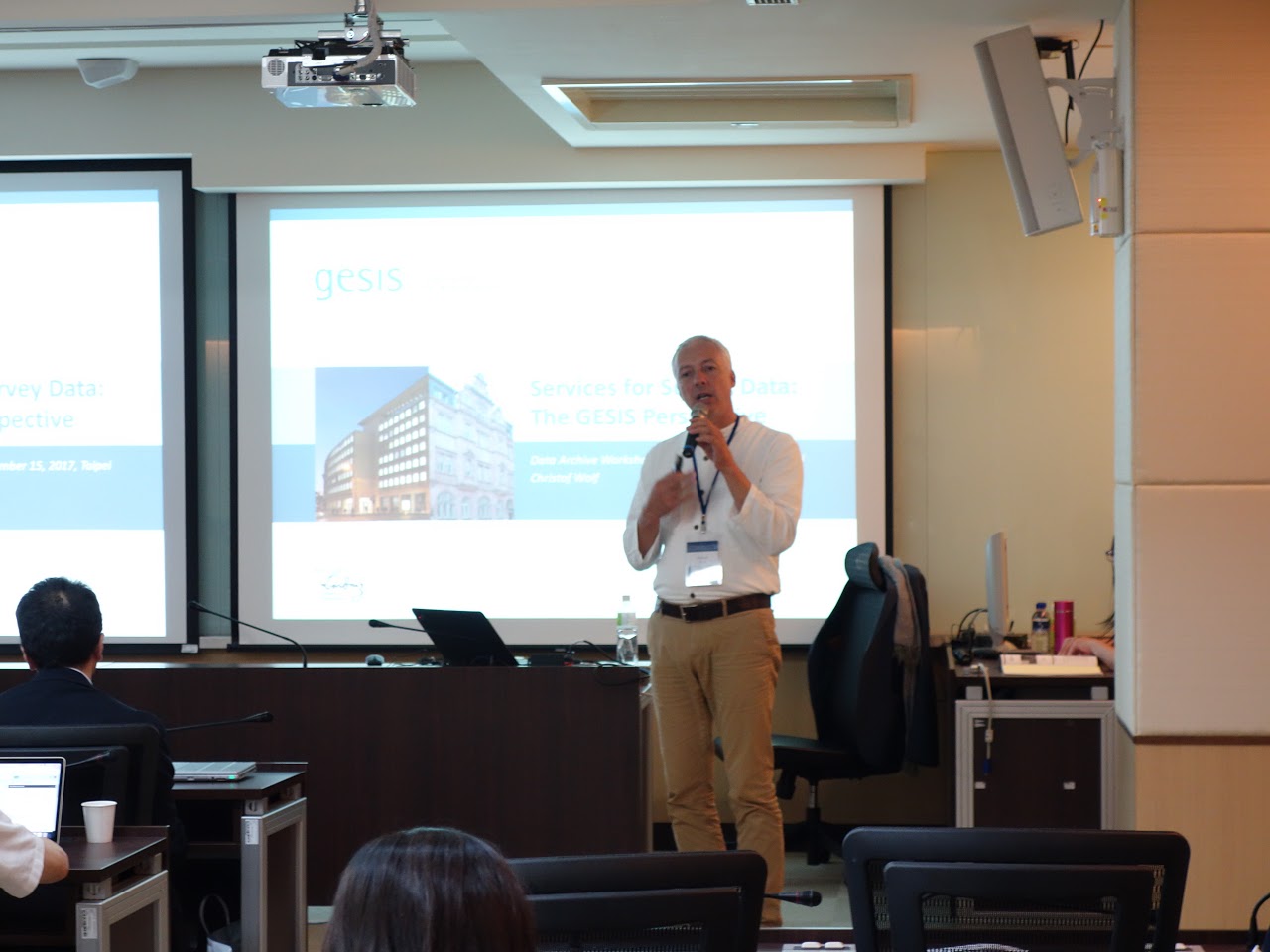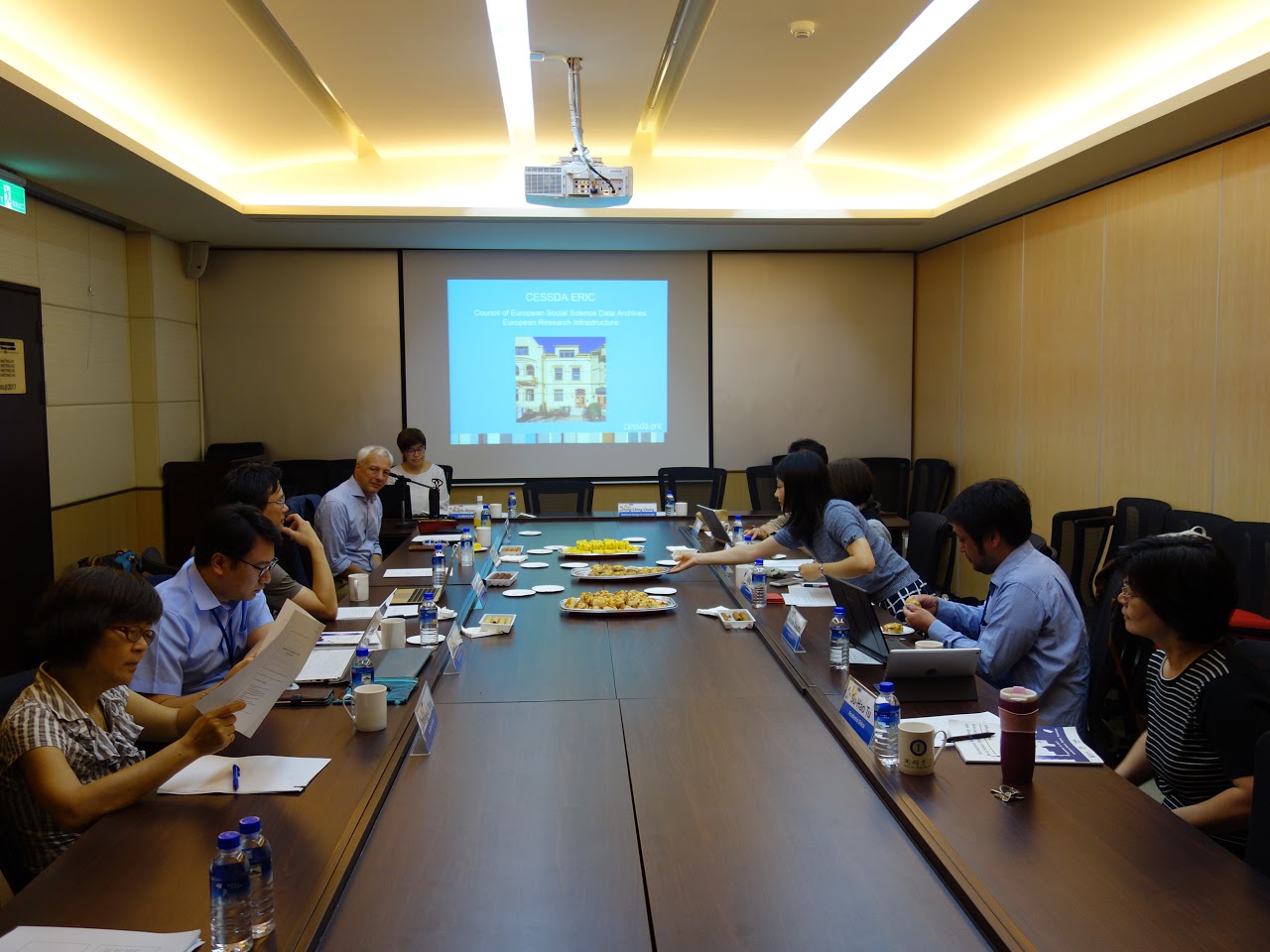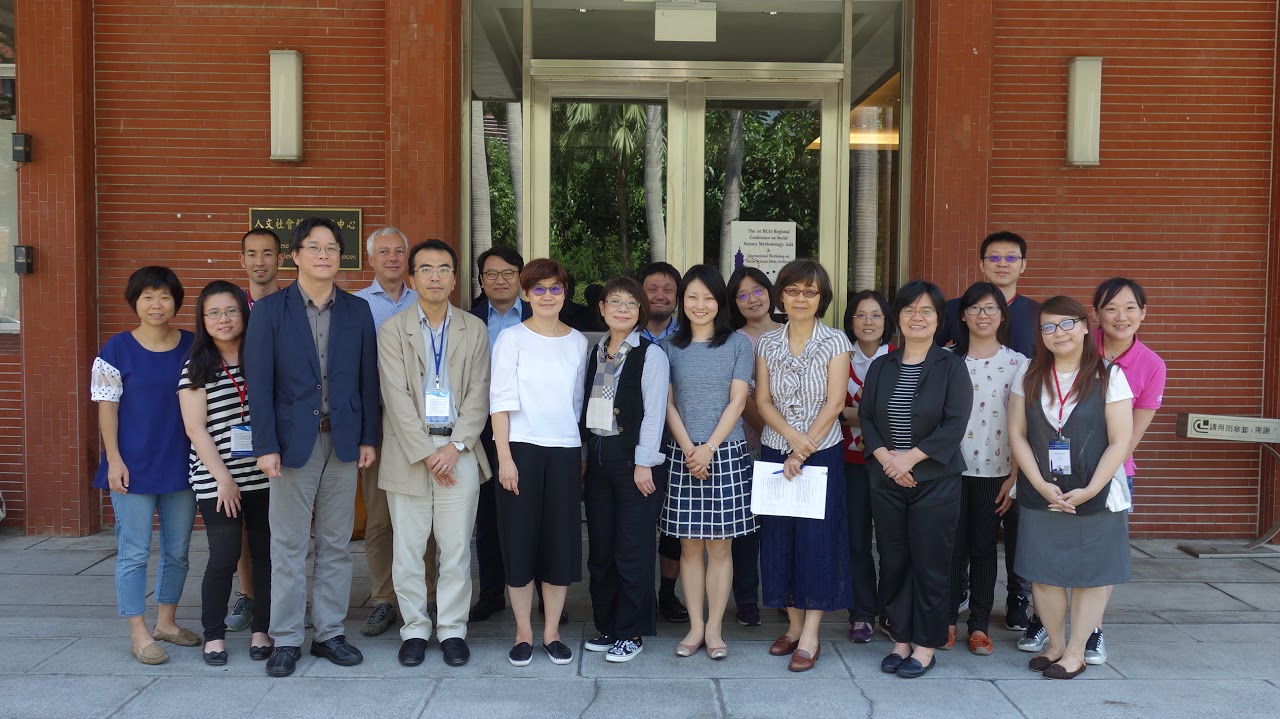Date: September 16, 2017
Place: Academia Sinica, Taiwan
Host institution: SRDA
THE INTERNATIONAL WORKSHOP ON SOCIAL SCIENCE DATA ARCHIVES
The International Workshop on Social Science Data Archives, sponsored by IASSIST, was held on September 15 in Conference Room II, Research Center for Humanities and Social Science (RCHSS), Academia Sinica, Taipei, Taiwan. The invited speakers included Prof. Dr. Christof Wolf from GESIS – Leibniz-Institute for the Social Sciences, Dr. Yukio Maeda and Dr. Kaoru Sato from Social Science Japan Data Archive (SSJDA), University of Tokyo, and Dr. Won-ho Park, Dr. Seokho Kim from Korea Social Science Data Archive (KOSSDA), Seoul National University.
The finalized workshop agenda is listed in the following. We also had Dr. Ruoh-rong Yu introduce the Survey Research Data Archive of Taiwan. The topics of the presentations covered data curation, preservation, and dissemination services provided by each data archive.
The registration of the workshop started May 1, 2017. The registration fee was NT$200, which included conference printed materials, lunch and light refreshments. 69 researchers attended the workshop. Most of the attendants were local scholars, while others were from Thailand, Turkey or other countries.
In the opening remarks, Dr. Chang stressed the importance of data archives, and gave a brief introduction to the speakers of the morning sessions.
The speaker of first session, Dr. Maeda, introduced the development and current practice of SSJDA. In addition, he also introduced some other data centers in Japan, including Leviathan Data Bank, Rikkyo University Data Archive, and Research Centre for Information and Statistics of Social Science at Hitotsubashi University.
SSJDA was started in 1998, with deposits amounting to 2,018 datasets. Its main collections include the Japanese General Social Surveys, Japanese Life Course Panel Surveys, Japanese Election Studies, National Family Research of Japan, Working Persons Survey, and Elementary School Students Survey. Researchers affiliated with academic institutions and graduate students can get access to SSJDA datasets for academic purposes. Applicants should sign an agreement (pledge) and get permission from PI in advance. Under the supervision of professors, undergraduate students are allowed to access certain data for paper writing. Such usage is classified as educational use, instead of research use. Some datasets are for research use only, and are not available for educational use.
SSJDA also offers several seminars on data usage and a one-week seminar on quantitative analysis every year. SSJDA built a desktop application for managing metadata based on the DDI lifecycle named Easy DDI Organizer (EDO). EDO can be used to edit metadata, import metadata and variable information from statistical software, and export documents. It is a useful tool for researchers, data users, and data archives. However, this system only has a Japanese version.
The second speaker was Dr. Park from KOSSDA. KOSSDA is Korea’s leading data archive, with expertise in the collection, dissemination, and promotion of research materials through various academic events and methodology education programs. Started in 1983 as a non-profit social science library, KOSSDA began to collect survey data in 2003, and moved to Seoul National University Asia Center in 2015.
KOSSDA collects survey data, statistical tables, qualitative interviews and narrative history data, documents, observation records, and other kinds of data produced by research institutes and individuals. KOSSDA also establishes digital databases, and provides access to the data. Its main collections include the Korean General Social Survey, ISSP Annual Topical Module Survey, Gallup Omnibus Survey, etc. KOSSDA has translated 250 survey datasets to English, including their questionnaires and codebooks.
KOSSDA is now rebuilding its website to enhance its data searching function and to improve web design. KOSSDA offers methodology training programs, data fairs, and a research paper competition every year.
After a 20-minute tea break, the presentation on SRDA kicked off. The speaker, Dr. Yu, is the Executive Director of the Center for Survey Research at Academia Sinica. SRDA was established in 1994. There are now eleven full-time workers in SRDA, including two IT staff members. The data archived by SRDA include survey data, census data, and in-house value-added data.
SRDA curates academic survey data such as the Taiwan Social Change Survey, Panel Study of Family Dynamic, Taiwan Social Image Survey, Taiwan Youth Project, Taiwan Education Panel Survey, and Taiwan’s Election and Democratization Study. In addition, SRDA also curates government survey data including the Manpower Survey, Manpower Utilization Survey, Woman’s Marriage, Fertility and Employment Survey, Survey of Family Income and Expenditure, Digital Opportunity Survey for Individuals and Households, Survey on Workers’ Living and Employment Conditions, etc. The number of datasets dissimilated by SRDA exceeds 2,800, in which 315 datasets have English versions.
A membership scheme is adopted by SRDA. Academia Sinica members are researchers at Academia Sinica. Regular members are faculty, researchers, students, or research assistants at colleges or research institutes. There are now about 2,302 members. A member can get access to most of the archived data by direct downloading from the SRDA website.
SRDA members can also apply for data with restricted access. The restricted datasets can be used via on-site access or remote access. All services provided by SRDA are now free of charge.
SRDA offers workshops, webinars, and on-campus lectures to promote data usage. In addition, SRDA maintains some social media websites such as a Facebook fan page (https://www.facebook.com/srda.taiwan/), Youtube Channel (https://www.youtube.com/user/SRDATW), and SRDA blog (http://srdatw.blogspot.tw/).
SRDA has been constructing a data-based bibliography for years. Since 2016, SRDA has begun to register DOI via da|ra. One task in progress is to construct a data integration platform for Taiwan Social Change Survey data of various years. Other main tasks include enlarging data storage, broadening membership, remodeling the website, developing data management plans, and constructing an evaluation scheme for data disclosure risk.
In the afternoon session, Dr. Chi-in Wu was the chair. The presenter, Dr. Wolf, introduced the development and current progress of GESIS. Relative to data archives of Asia countries, the budget and personnel of GESIS are very large. GESIS was founded in 1960, and the data archive for social science is one of the five research departments of GESIS. There are about 70 staff members in the data archive for social science, belonging to seven teams.
GESIS currently has about 6,000 datasets, which mainly focus on migration, election, values and attitudes, and social behavior. ISSP, CSES, EVS, and ALLBUS are some well-known social science survey programs. It is easy for PIs to upload datasets through the Datorium system, which is a self-deposit service for sharing data.
Dr. Wolf stressed the importance of DOI (Digital Object Identifiers), and introduced the DOI registration service build by GESIS—da|ra. Da|ra has 576,297 registered DOI names and 88 data providers worldwide, including ICPSR, SRDA, etc. In addition to hosting da|ra, GESIS is devoted to developing international standards for data documentation and data archiving, and providing training and consulting services to researchers.
In the presentation, Dr. Wolf also talked about the secure data center of GESIS. The secure data center enables researchers to access sensitive, and weakly anonymized data. It is a locked room without internet. Users have to sign contracts in advance. Any inputs and outputs are required to be checked for disclosure risk. In the future, the secure data center will establish a remote access system, which can provide secure access to the data curated in CESSDA.
A business meeting was kicked off on the next day (September 16). Besides the guests from GESIS, KOSSDA and SSJDA, participants of the meeting included researchers at the Center for Survey Research, and all the staff of SRDA.
There have been frequent connections among KOSSDA, SSJDA and SRDA in recent years. Conferences and/or workshops were hosted in rotation in 2008, 2012, 2014, 2015, 2016, and 2017.
In 2016, KOSSDA organized an international conference with invited guests from SSJDA at the University of Tokyo (Japan), CNSDA at Renmin University (China), and SRDA at Academia Sinica (Taiwan). In this conference, a consensus was reached to develop a regional association of data archives in Asia countries, namely the Networks of Asian Social Science Data Archive (NASSDA).
The main purpose of the business meeting this year was to discuss possible future collaboration among data archives in Asia countries. The brief conclusions are listed in the following.
- To build a joint data catalogue for the archives involved.
- To construct web linkages and brief introduction among archives.
- To have a contact person for each data archive for future cooperation.
NASSDA members will hold annual workshop or conferences on a rotating basis. Further collaboration will be discussed in the near future.
